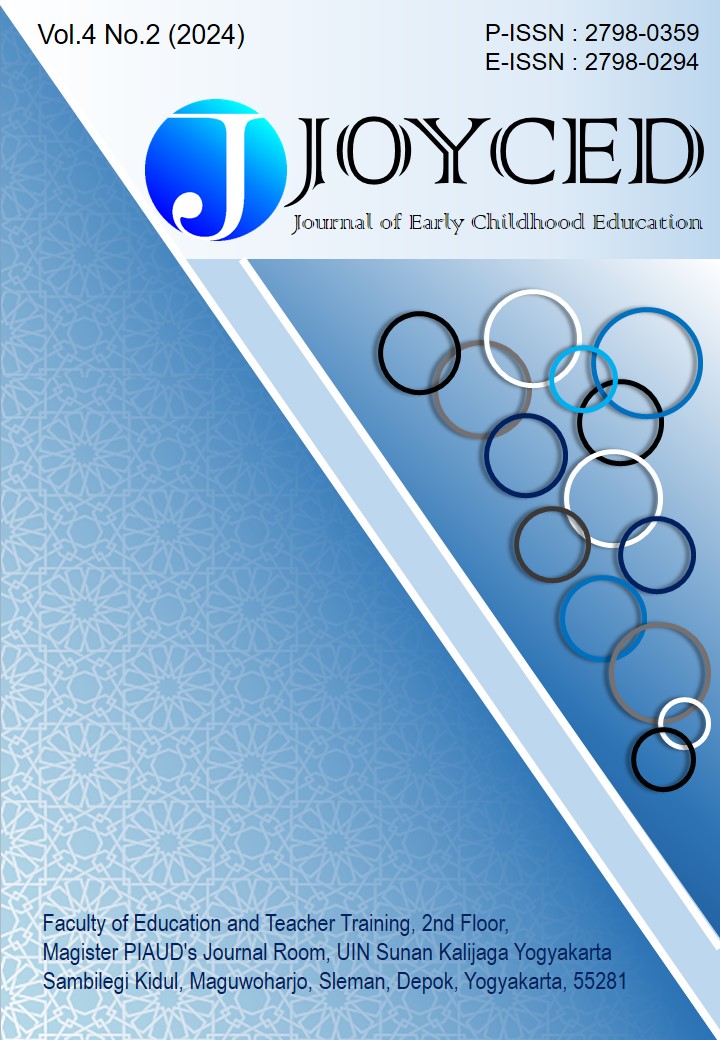Parents' Perception of Bedtime Stories as An Effort to Build Early Literacy
DOI:
https://doi.org/10.14421/joyced.2024.42-07Keywords:
Bedtime Storytelling, Early Literacy, Parents’ PerceptionAbstract
Early literacy is a child's ability to interact with information across media, forming a foundation for cognitive, language, and social development. Research highlights that bedtime storytelling plays an important role in stimulating children's literacy development. However, do parents have the same perspective? This study aims to explore parents' perception of bedtime storytelling as a tool to foster early literacy in children. A mix method was used, with data collected through surveys containing indicators to measure parental perceptions. These findings reveal three important points: First, parents generally have the same and conceptually accurate that bedtime storytelling is important. Second, there is variation in parents' understanding of early literacy, with few fully understanding the concept. Third, parents have a positive perception of the role of bedtime storytelling in building early literacy, although they face challenges such as limited leisure time and a lack of effective storytelling techniques. The study emphasizes the importance of proactive efforts by parents and other stakeholders to overcome these barriers and include bedtime storytelling as a routine habit. This practice can serve as a powerful and fun way to improve children's early literacy skills, fostering a lifelong love of learning and reading.
References
Astuti, E. (2022). School literacy movement to foster children's ethical values. Ilmia Journal of Education, History, and Humanities, 6(2), 17–24. https://widyasari-press.com/wp-content/uploads/2022/03/3.-Eny-Astuti-Gerakan-Literasi-Sekolah-Untuk-Menumbuhkan-Nilai-Budi-Pekerti-Anak-1.pdf
Butauski, M., & Horstman, H. K. (2020). Parents' Retrospective Storytelling of Their Child's Coming Out: Investigating Contributions of Communicated Perspective-Taking in Relation to Well-Being. Journal of Family Communication, 20(4), 345–359. https://doi.org/10.1080/15267431.2020.1794872
Chilvers, N. J., Birla, R., Clark, A., & Clark, S. (2021). Cardiopulmonary Transplant Surgery - A Bedtime Story. The Journal of Heart and Lung Transplantation, 40(4). https://doi.org/10.1016/j.healun.2021.01.698
Choirina, V. N. (2020). The relationship between parents' storytelling habits with books and early reading ability in children of group B age. Journal of Child Education, 9(1), 63–69. https://doi.org/10.21831/jpa.v9i1.31354
Duong, C. D. (2023). Applying the stimulus-organism-response theory to investigate determinants of students' social entrepreneurship: moderation role of perceived university support. Social Enterprise Journal, 19(2), 167–192. https://doi.org/10.1108/SEJ-10-2022-0091
Hamlyn, D. W. (2022). Perception, Learning and the Self. Routledge. https://doi.org/10.4324/9781003313250
Hasannah, R. G. U. (2019). The effectiveness of storytelling methods in preschool. PSYCHOBORNEO : Scientific Journal of Psychology, 7(3), 557–569. http://e-journals.unmul.ac.id/index.php/psikoneo/article/view/4793
Kargiotidis, A., & Manolitsis, G. (2024). Are children with early literacy difficulties at risk for anxiety disorders in late childhood? Annals of Dyslexia, 74(1), 82–96. https://doi.org/10.1007/s11881-023-00291-7
Kemala, S., Erhamwilda, & Mulyani, D. (2022). The Relationship between Bedtime Storytelling and Socio-Emotional Development of Children Aged 4-5 Years in Mekar Rahayu, RW 02. Bandung Conference Series: Early Childhood Teacher Education, 2(2), 101–109. https://doi.org/10.29313/bcsecte.v2i2.4085
Landrum, R. E., Brakke, K., & McCarthy, M. A. (2019). The pedagogical power of storytelling. Scholarship of Teaching and Learning in Psychology, 5(3), 247–253. https://doi.org/10.1037/stl0000152
Marsh, S., Dobson, R., & Maddison, R. (2020). The relationship between household chaos and child, parent, and family outcomes: a systematic scoping review. BMC Public Health, 20(1), 513. https://doi.org/10.1186/s12889-020-08587-8
Ne'eman, A., & Shaul, S. (2023). The Association Between Emergent Literacy and Cognitive Abilities in Kindergarten Children. Child & Youth Care Forum, 52(2), 467–488. https://doi.org/10.1007/s10566-022-09697-7
Nuryati, N., Muthmainnah, M., Lubis, H. Z., Talango, S. R., Ibrohim, B., & Nadjih, D. (2021). Role Playing Method in Increasing Early Childhood Achievement Motivation During the Learning From Home Period. As-Sibyan: Journal of Early Childhood Education, 6(2), 139–148. https://doi.org/10.32678/as-sibyan.v6i2.4649
Oktaviani, M., Novitasari, A. W., Glosalalia, Madinatuzzahra, & Aulia, N. (2022). The Role of Parents in Stimulating the Language Development of Preschool Children. JKKP (Journal of Family Welfare and Education), 9(2020), 55–67.
Otoluwa, M. H., Rasid Talib, R., Tanaiyo, R., & Usman, H. (2022). Enhancing Children's Vocabulary Mastery Through Storytelling. JPUD - Journal of Early Childhood Education, 16(2), 249–260. https://doi.org/10.21009/jpud.162.05
Permatasari, A. N., Inten, D. N., Mulyani, D., & Rahminawati, N. (2017). Early Literacy with Storytelling Techniques. FamilyEdu Journal, 3(1), 20–28.
Piaget, J. (2005). The Language and Thought of the Child. In The American Journal of Psychology. Taylor & Francis e-Library. https://doi.org/10.2307/1415214
Prameswari, T. W. (2020). Freedom of Learning: An Early Childhood Learning Concept Towards a Golden Indonesia 2045. Prosding National Seminar on Reasoning and Research of the Archipelago, 1, 76–86.
Shaleh, M., Batmang, B., & Anhusadar, L. (2022). Collaboration of Parents and Educators in Stimulating Early Childhood Literacy Development. Journal of Obsession: Journal of Early Childhood Education, 6(5), 4726–4734. https://doi.org/10.31004/obsesi.v6i5.2742
Siregar, H. M. (2022). Development of a Questionnaire Instrument for Mathematics Education Students' Perception of Online Learning. AXIOMS: Journal of Mathematics Education Study Program, 11(2), 971. https://doi.org/10.24127/ajpm.v11i2.4702
Solichah, N., Solehah, H. Y., & Hikam, R. (2022). Perception and Role of Parents and Teachers on the Importance of Literacy Stimulation in Early Childhood. Journal of Obsession: Journal of Early Childhood Education, 6(5), 3931–3943. https://doi.org/10.31004/obsesi.v6i5.2453
Sufiati, V., & Paramita, M. V. A. (2021). How to Literacy Early with Bedtime Stories? Journal of Early Childhood Education Undiksha, 9(1). https://doi.org/10.23887/paud.v9i1.32837
Sumaryanti, L. (2018). Cultivating literacy in early childhood with the storytelling method. AL-ASASIYYA: Journal Of Basic Education, 3(1), 117. https://doi.org/10.24269/ajbe.v3i1.1332
Suparya, I. K., I Wayan Suastra, & Putu Arnyana, I. B. (2022). Low Science Literacy: Causative Factors and Alternative Solutions. Scientific Journal of Education Citra Bakti, 9(1), 153–166. https://doi.org/10.38048/jipcb.v9i1.580
Syamsiyah, N., & Hardiyana, A. (2021). Implementation of Storytelling Methods as an Alternative to Improve Early Childhood Language Development. Journal of Obsession: Journal of Early Childhood Education, 6(3), 1197–1211. https://doi.org/10.31004/obsesi.v6i3.1751
Teale, W. H., Whittingham, C. E., & Hoffman, E. B. (2020). Early literacy research, 2006–2015: A decade of measured progress. Journal of Early Childhood Literacy, 20(2), 169–222. https://doi.org/10.1177/1468798418754939
Ulfadhilah, K. (2021). Family Education on the Quality of Children in the Covid-19 Era. JOYCED: Journal of Early Childhood Education, 1(1), 8–19. https://doi.org/10.14421/joyced.2021.11-02
Vygotsky, L. (2006). Thought and language. In Thought and language. https://doi.org/10.1037/11193-000
Wardana, A. N., Hairunnisa, & Wibowo, S. E. (2018). The Effect of Perception of SMAN 2 Samarinda Students on Interest in Choosing Mulawarman Inoversity (Study on Grade 3 Students). E-Journal of Communication Sciences, 6(4), 327–341.
Wijayatiningsih, T. D., Budiastuti, R. E., Ifadah, M., Mulyadi, D., & Aimah, S. (2019). Perception of Bunga Cahaya Kindergarten Students and Teachers towards the Implementation of Literacy from an Early Age. Education, 2012, 1–4.
Yansyah, Y., Hamidah, J., & Ariani, L. (2021). Development of Bilingual Big Book Storytelling to Improve Early Childhood Literacy. Journal of Obsession : Journal of Early Childhood Education, 6(3), 1449–1460. https://doi.org/10.31004/obsesi.v6i3.1779
Yusmar, F., & Fadilah, R. E. (2023). Analysis Of Low Science Literacy Of Indonesian Students: Pisa Results And Causative Factors. LENSA (Science Lantern): Journal of Science Education, 13(1), 11–19. https://doi.org/10.24929/lensa.v13i1.283
Zahrawanny, V. P., & Fitria, N. (2019). Parents' perception of the benefits of early childhood education to support sending children to school in early childhood institutions. Journal of Integrative Holistic Early Childhood (AUDHI), 2(1), 21. https://doi.org/10.36722/jaudhi.v2i1.577
Zati, V. D. A. (2018). Efforts to increase interest in early childhood literacy. The Golden Age Potpourri, 4(1), 18–21.
Zivan, M., & Horowitz-Kraus, T. (2020). Parent–child joint reading is related to an increased fixation time on print during storytelling among preschool children. Brain and Cognition, 143, 105596. https://doi.org/10.1016/j.bandc.2020.105596






.png)











